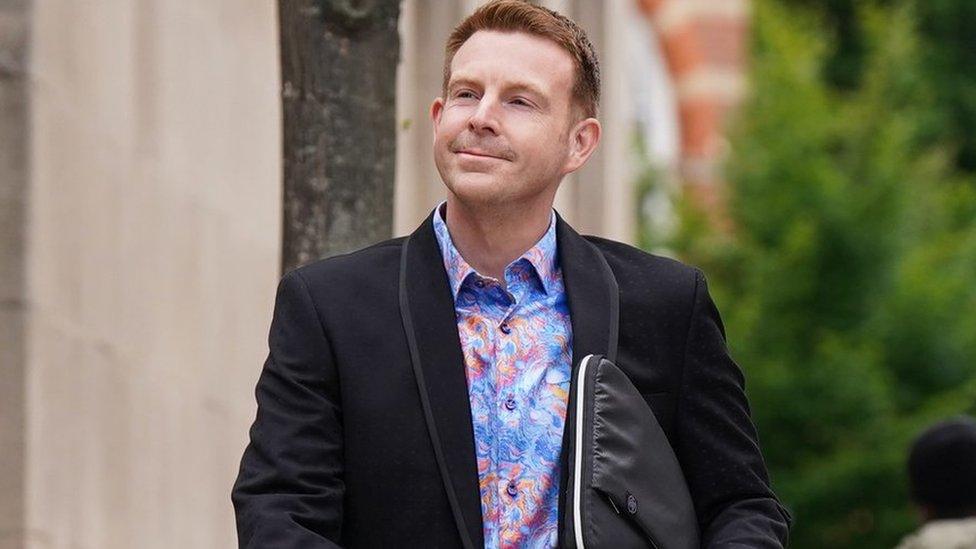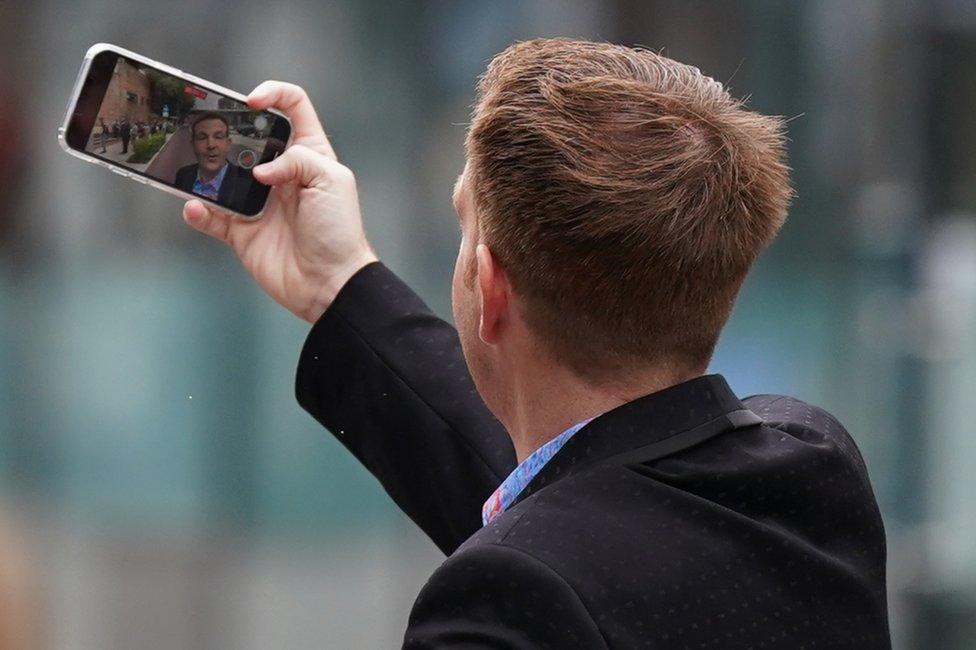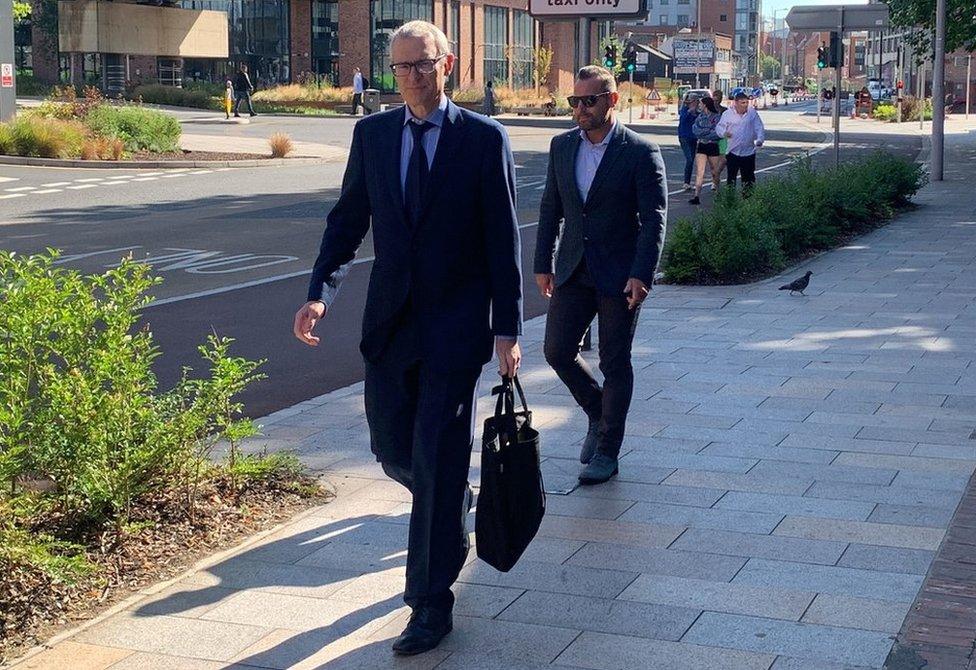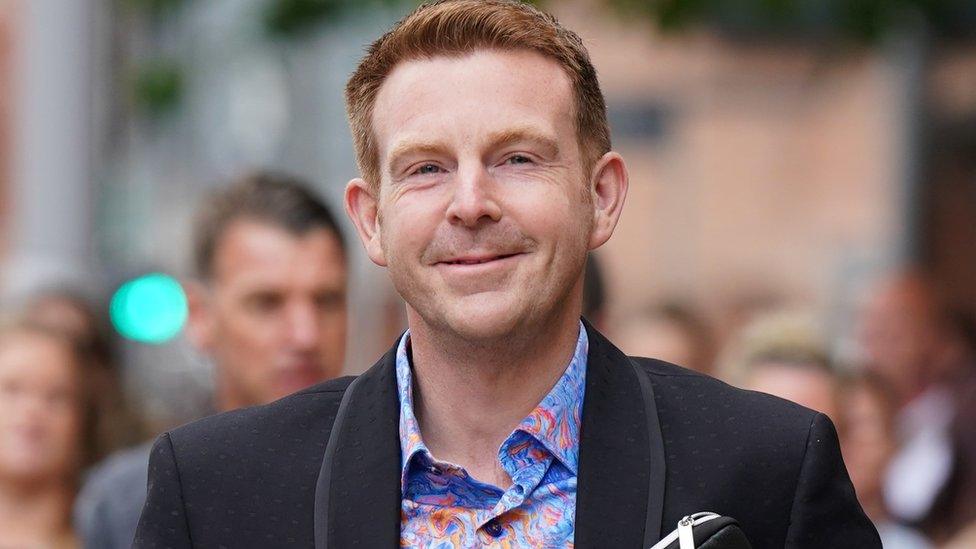Alex Belfield tells trial he is victim of BBC witch-hunt
- Published

Alex Belfield is on trial at Nottingham Crown Court
A former BBC radio presenter accused of stalking eight people including Jeremy Vine has told jurors he is the victim of a witch-hunt.
Alex Belfield, 42, from Nottingham, claims the BBC and police colluded in order to get him arrested.
Mr Belfield is accused of stalking by sending emails, making YouTube videos and posting messages on social media.
However, he claims he had legitimate reasons for doing so, and has a right to freedom of speech.
Mr Belfield told the jury: "I'm a Nottingham lad with a potty mouth and I speak as I find it, and I appreciate that's not to everyone's taste.
"People who claim I was stalking them were actively seeking out my content.
"Human rights allows me to have free speech in this country, until you are given bail conditions where you cannot speak."
Mr Belfield is not accused of physically stalking the complainants, who are mostly current or former BBC staff.
The full wording of the charges states that he "pursued a course of conduct that amounted to harassment" of the complainants, which caused them "serious alarm or distress" and "amounted to stalking".
The charges cover a time period of more than eight years, and are as follows:
Stalking Rozina Breen between 25 November 2012 and 31 March 2021
Stalking Liz Green between 25 November 2012 and 31 March 2021
Stalking Helen Thomas between 25 November 2012 and 31 March 2021
Stalking Stephanie Hirst between 1 June 2017 and 31 March 2021
Stalking Bernard Spedding between 25 November 2012 and 31 March 2021
Stalking Ben Hewis between 29 September 2019 and 31 March 2021
Stalking Philip Dehany between 3 November 2019 and 31 March 2021
Stalking Jeremy Vine between 1 April 2020 and 31 March 2021
The trial began on 5 July and has heard evidence from the complainants and numerous other prosecution witnesses.
Mr Belfield, who is defending himself decided not to give evidence, but he addressed the jury during his closing speech.
He now runs a YouTube channel called The Voice of Reason, but he told jurors he had previously worked for the BBC for 15 years.
"I was hugely successful on over 30 radio stations," he told jurors.
However, he said it "all went wrong" when he went to work at BBC Radio Leeds.
The trial previously heard he was given a job presenting the mid-morning programme on the station in spring 2010.
One of the complainants, Liz Green, was a fellow presenter there.
However, Mr Belfield told jurors he was in fact bullied by Ms Green and said he was "the victim".
"She was intimidated by my success", he claimed.
Mr Belfield read out what are known as "agreed facts", which are facts agreed as evidence by the prosecution.
According to the agreed facts, there was an internal BBC investigation in relation to correspondence Ms Green received from Mr Belfield.
However, it was decided that the monitoring should not continue, because the emails were "inoffensive", "non-threatening", and Mr Belfield was deemed to pose "no risk to BBC staff".
Also mentioned in the agreed facts was an internal BBC email, in which Mr Belfield was deemed to present "no personal danger" to another complainant, Bernard Spedding, or any other BBC staff.

Alex Belfield now runs a YouTube channel called The Voice of Reason
Mr Belfield told the jurors that the BBC was trying to "shut me up" because he had been saying things that were "inconvenient truths".
He said he had been raising issues on air, in his role as a journalist, "for the right reasons".
"To be spoken about publicly can be alarming or distressing, but it doesn't mean it's untrue," he said.
He told jurors he had been arrested five times, strip-searched in order to "humiliate" him, and his house had been "raided" three times by Nottinghamshire Police.
He said his broadcast equipment was seized by police officers, which he believed was done in an attempt to "silence" him.
"They put me in a cell for talking," he said.
"As a whisteblower of the BBC, I was there for 15 years and I saw where the bodies are buried, if you like, and I saw where they waste money."
He gave jurors an example of the BBC's booking system for train tickets, saying it would cost about £150 to book a ticket via this, when he could purchase a first class ticket for the same journey himself at the cost of only £32.
'Legitimate journalism'
He said since leaving the BBC he had written articles for national newspapers about money being wasted by the organisation, and claimed he had "bought my house" with the money he earned doing this.
"I was the most successful anti-BBC journalist in the country," he said.
He said many of the emails he sent to the BBC were freedom of information (FOI) requests, which he sent for legitimate reasons as a journalist.
He also said some of the emails were sent to the BBC press office in order to get responses to stories he worked on, and were "all 100% legitimate journalism".
"I am a journalist who is instinctively going to upset people by the nature of what I do," he said. "Nobody wants to be exposed. Nobody wants to be caught out."

Mr Belfield was previously a presenter at BBC Radio Leeds
He complained about his treatment by police.
"Can you imagine if this happened to Piers Morgan, or to Nick Ferrari, or to Kay Burley, or if this happened to Graham Norton or to anyone at the BBC?" he said.
"Can you imagine having your freedom taken away, being strip-searched, and the humiliation of having Nottingham police sent to your home three times by the BBC?"
Mr Belfield's former boss at BBC Radio Leeds, Rozina Breen, previously said in her evidence that Mr Belfield's one-year contract had not been renewed, and he had harassed her since then.
However, Mr Belfield told jurors he had resigned "because they didn't want to give me more money, which is fine".
Ms Breen said Mr Belfield had sent up to 6,000 emails to the BBC, but Mr Belfield said it was "a lie and ludicrous" to suggest he had sent so many.
He also said that only 29 emails were produced as evidence by the prosecution.

BBC presenter Jeremy Vine is among eight alleged stalking victims
Mr Belfield criticised Jeremy Vine's evidence, which he described as "the cleverest razzle dazzle I've ever seen".
"He cried at one point, which I am sorry about. But do you remember, it wasn't to do with me?" he said.
Mr Vine had told the court that one of Mr Belfield's followers posted something under a tribute he posted to his late father on Facebook, saying: "What would your father have said if he had known his son was a thieving toe-rag?"
Mr Belfield told jurors: "I'm sorry if it happened but it was nothing to do with me."
The message was in reference to £1,000 which the BBC donated to a memorial fund for a radio executive who had been friends with Mr Vine, and Mr Belfield publicly accused Mr Vine of "stealing" the money.
'Unthinkable' comparison
Mr Belfield also criticised Mr Vine for describing him in court as "the Jimmy Savile of trolling".
"What possible reason could Jeremy Vine have said this in front of you other than to destroy me and get the headline of the century, which he did?" said Mr Belfield.
"He thought of the most evil, awful person in media history and compared me to him.
"For him to associate me with Jimmy Savile is unthinkable."
Because Mr Belfield was not giving evidence, some of the claims he made during his closing speech could not be challenged by the prosecution by way of cross-examination.
The judge Mr Justice Saini told jurors that Mr Belfield had "introduced things" that had not been heard in evidence, and they "must disregard those" when deciding whether or not he is guilty.
He told the jury: "A journalist is entitled to be provocative and controversial.
"The prosecution say that what Mr Belfield did went beyond any reasonable exercise of free speech rights."
Belfield denies all the charges and the trial continues.

Follow BBC East Midlands on Facebook, external, Twitter, external, or Instagram, external. Send your story ideas to eastmidsnews@bbc.co.uk, external.
Related topics
- Published13 July 2022

- Published6 July 2022

- Published5 July 2022
